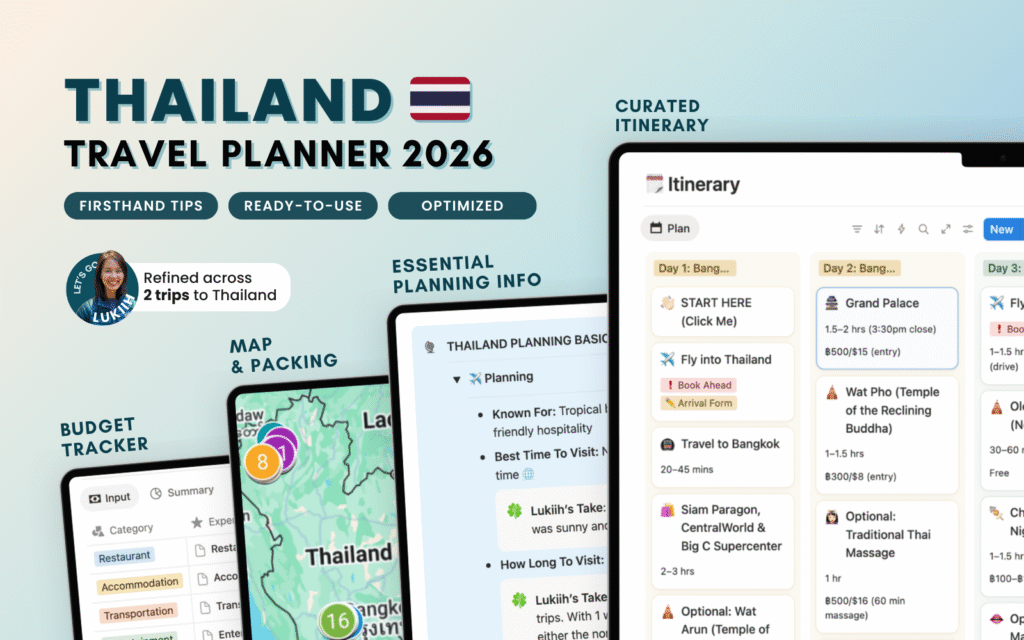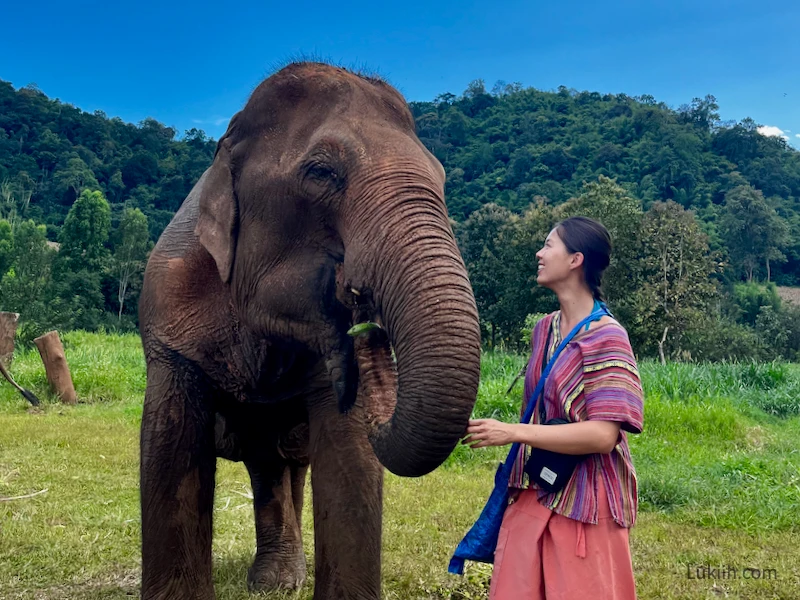Visiting an elephant sanctuary, where visitors feed and interact with elephants, is one of Thailand’s most popular activities. Using a clear travel rating system, I share what visiting one is like—plus tips from my own trip.
Lists By Lukiih is readers-supported. When you buy with my affiliate link, I may earn a small commission. Thanks!
🍀 Lukiih’s Verdict
Visiting an ethical elephant sanctuary is a must-do experience in Thailand. It was one of the highlights of my trip.
- Seeing these majestic creatures up close is delightful and rewarding. I urge you to do the due diligence to ensure the sanctuary is genuinely ethical.
- Elephant sanctuaries are affordable, and the package includes transportation and lunch.
- Minimal preparation is required, as you only need to book in advance and wear suitable clothes and shoes.
Note that many captive elephants in Thailand look “rough” because they’re typically rescued from industries that use them for manual labor.
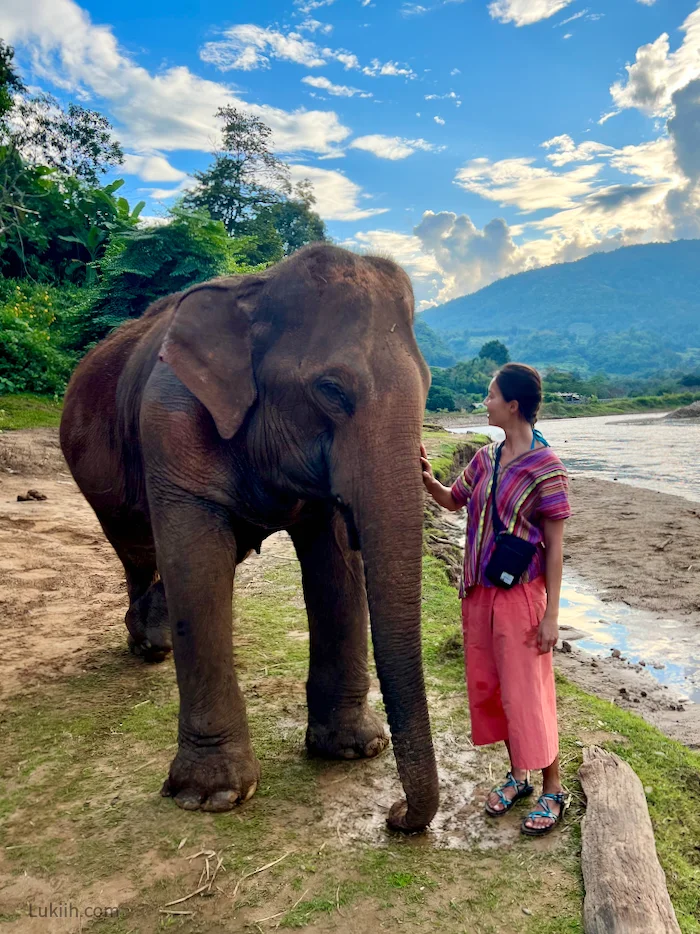
🇹🇭 Planning A Trip To Thailand: 12 Practical Things To Know
🏆 Where Does It Rank?
Visiting an ethical elephant sanctuary ranks as the #1 experience I had in Thailand. Here’s how it compares to other things I did on my trip:
🏝️ 10 Epic Days in Thailand: An Active & Unique Itinerary
✈️ About My Trip
For context on my review, here’s what to know about my trip:
- I finance my trips and don’t receive sponsorship; this review reflects my honest opinions.
- I visited an elephant sanctuary in 2022, but this post has updated 2025 information.
- My Thailand trip was in November when it was more crowded and expensive.
- Elephant sanctuaries are a rare experience. Elephants are Thailand’s national animals. For centuries, they’ve been a culturally significant icon used for wars, entertainment, transportation, etc. Their deep history has created a unique elephant tourism industry in Thailand that’s accessible and striving towards welfare and conservation.
- As someone from the US, I’ve only looked at elephants from afar at a zoo. Walking next to these giants and being close to them was majestic and unforgettable.
Learn what ethical elephant treatment is in tourism.
- Other countries, including Sri Lanka, India, South Africa, Nepal, and Cambodia, also offer elephant tourism.
- Depending on the sanctuary, the surrounding area may not be as natural or beautiful as expected, which decreases memorability.
- I found walking and feeding elephants in Thailand very fun and delightful. Watching elephants use their muscular trunks to gently take a banana from your hand is incredible. Their dexterity is phenomenal.
- I left the sanctuary with a much deeper understanding and awareness of elephants’ role in history and how to support ethical treatment in tourism in the future.
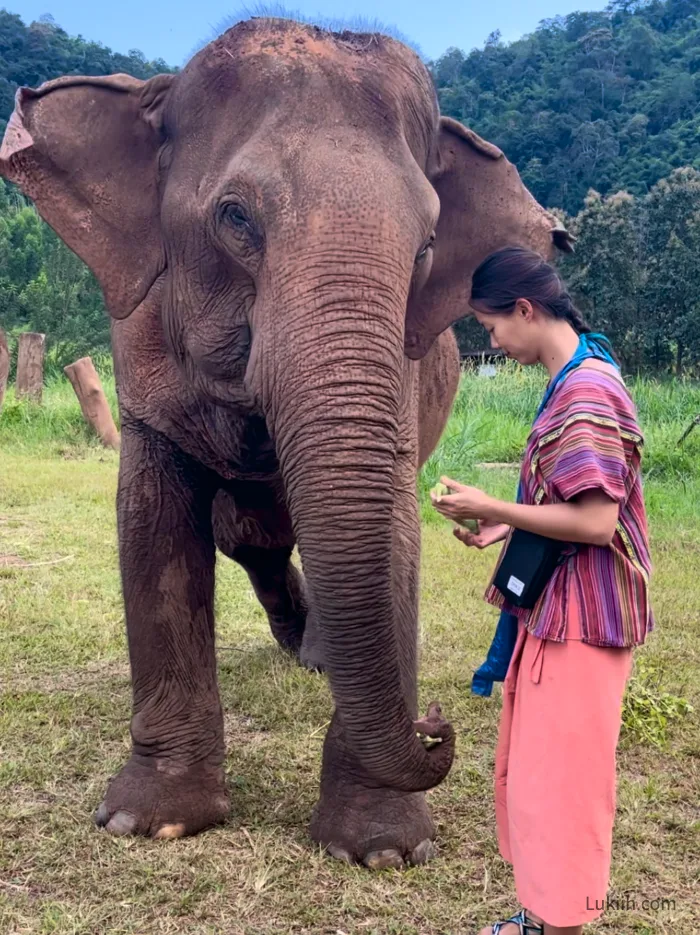
- The “right way” to treat elephants is a complex issue with ongoing debate, so you have to wrestle with whether your participation is doing harm or good.
Not all elephant “sanctuaries” are ethical. As demand for ethical tourism has increased, some companies have rebranded themselves as sanctuaries but still employ dubious practices.
Boycotting elephant sanctuaries is ineffective because some rescue centers genuinely support elephants and depend on tourism money to care for them (releasing captive elephants back into the wild is very challenging).
A half-day elephant sanctuary visit costs between $50 and $70, and a full-day visit is double the amount. I booked with Happy Elephant Home and paid $50 for a half-day tour.
Thailand’s most ethical elephant sanctuary charges $70 for a half-day tour.
💰 My Thailand Trip Cost: Budget Breakdown (2025)
- No special skills or endurance are needed. Some places require a short walk or hike to observe elephants.
- Ethical elephant sanctuaries are typically located in forests and national parks where the animals have enough space to roam. Almost all sanctuaries provide vehicle transportation, and the ride normally takes 30 minutes to 3 hours.
- Book a sanctuary visit 2 days to a week in advance. For the popular Elephant Nature Park, you’ll need to book one to two months ahead (I booked too late, so I missed out and went with another organization). You only need to pack a few items to visit a sanctuary.
How To Guide & Tips
Interested in visiting an elephant sanctuary after reading my review? Below is a practical how-to guide and firsthand tips.
Brief History
Why is Thailand known for elephant tourism? The TLDR is:
- Historical importance – For centuries, elephants have played an important role in Thailand and were used for everything from royal processions to logging to warfare.
- Shift to tourism – Due to urbanization, habitat loss, and changing Thai laws, elephants were increasingly used for entertainment (e.g., elephant rides and circuses).
- Welfare awareness increases – As elephant tourism became popular, non-profits researched how it negatively impacts animal welfare. This has increased the demand for more ethical elephant encounters and interactions in tourism.
Elephant riding is still popular and legal in Thailand despite being proven harmful and unethical. Demand for it has lessened but has yet to disappear.
What Is Ethical
The “right way” to treat elephants is a complex issue. There’s an ongoing debate among experts and caretakers on what’s considered ethical treatment. Here’s the consensus so far:
| Tourist Activity | Is It Ethical? |
|---|---|
| Riding | 🚫 Very unethical |
| Bathing | 🚫 Likely unethical |
| Touching | ❓ Ethically questionable |
| Feeding | ❓ Ethically questionable |
| Walking | ❓ Ethically questionable |
| Observing | ✅ Ethical, if from afar |
- Elephant rides – Riding elephants is highly unethical because they lead to deformed spines and psychological damage and require physical abuse for training.
Ethical sanctuaries not only prohibit riding, but they also condemn them.
- Elephant bathing – This is currently a common practice, but it’s likely unethical because bathing with tourists is typically forced and not part of natural behavior.
Elephants defecate in the water they bathe in, so tourists who bathe with them can get transmitted diseases.
- Touching, feeding, and walking – These are only slightly more ethical if elephants aren’t forced to interact with people in any way.
The most ethical way to treat elephants is to leave them alone without human interaction. However, since that’s not possible for all captive elephants, the best thing to do is to minimize forced contact.
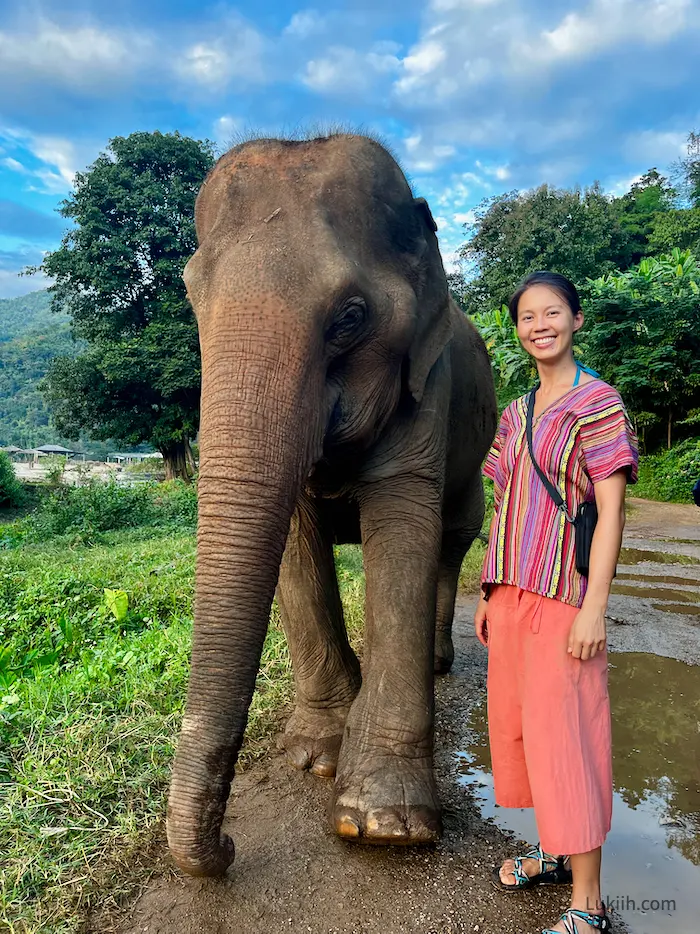
Ethical Sanctuaries List
Below are some of the most ethical elephant sanctuaries in Thailand. They encourage little to no interactions with elephants and have very positive reviews on Google and Tripadvisor.
- Elephant Nature Park (Chiang Mai)– ENP is considered Thailand’s most ethical elephant sanctuary and is a leader in setting new ethical models for other camps.
- BEES (Chiang Mai) – BEES has a “No Contact – Hands-Off” policy and typically only offers more robust ethical experiences.
- Kindred Spirit Elephant Sanctuary (Chiang Mai) – Kindred is invested in providing a natural habitat for its elephants to roam and forage in. Visitors have to hike to observe them. They only offer two-day and three-day packages.
- ChangChill (Chiang Mai) – ChangChill has worked with World Animal Protection to stop visitors from directly interacting with elephants.
- Following Giants (Krabi & Koh Lanta) – Following Giants has an observations-only model and prides itself on providing an educational experience.
- Phuket Elephant Sanctuary (Phuket) – Known for its popular canopy walks, this sanctuary sets best practices in Phuket.
I booked my experience with Happy Elephant Home. I recommend them with the caveat that they offer bathing. During my visit, one of their elephants, Molo, didn’t get into the water and walked slower than the visitors. The guide did not force or encourage the elephant to bathe or walk faster; they just let Molo be. While it would be more ethical if they stopped elephant bathing, they at least didn’t force their elephants to do tourist activities.
What To Pack
Bring the following items to an elephant sanctuary:
- Sunscreen – You’ll be outside, even if you’re just observing.
- Insect repellent – Sanctuaries are located in lush areas where mosquitos and other bugs are prevalent
- Sturdy shoes – If you’re walking with elephants or hiking to them, you’ll often have to walk through muddy trails. I wore my Chacos and thought they worked well.
- Cash – Bring some to donate, tip the guide, or buy a souvenir.
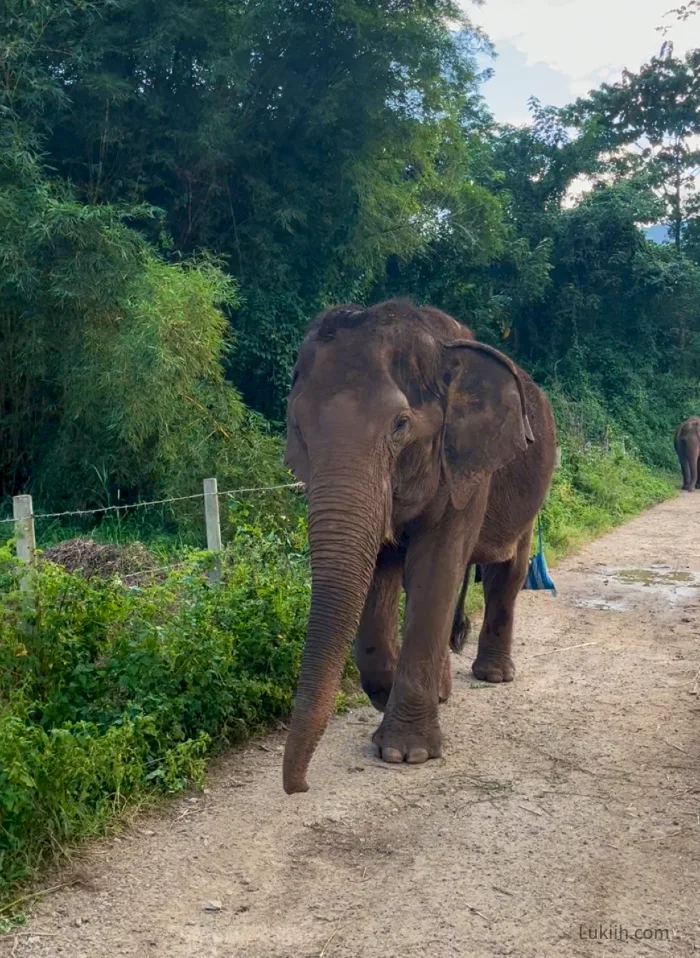
Thailand Trip Planner 2026
Make planning easier with my flexible, research-backed travel planner—shaped by real experience. It has:
- 2026 travel info
- Curated itinerary
- Practical insights & tips
- Simple budget tracker
- Destination-specific packing list
- Fully customizable sections
Built in Notion, this is the tool I personally use to plan every trip. I genuinely love it and creating a Notion account is free.
Lists by Lukiih is a small site I fund myself. Downloading my trip planner is the best way to support me and keep it running—thanks!
